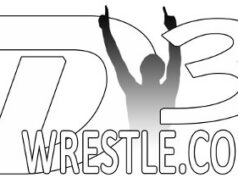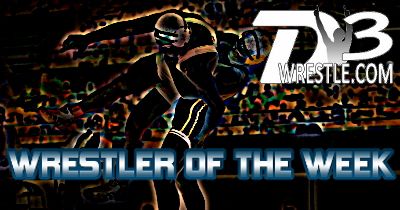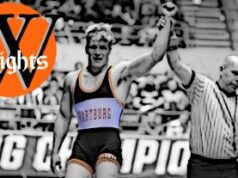Finally, today we have the conclusion of the three-part interview with Naval Academy Prep School coach and 2003 NCAA Division III champion LeRoy Gardner. Part 1 | Part 2
d3wrestle.com: Now that you are at the Naval Academy Prep School in Newport, Rhode Island, what sort of philosophy or strategy do you bring to coaching? What type of technique and training do you focus on, and how do you view your role as a coach for students who plan to attend the U.S. Naval and Coast Guard Academies the next year?
LeRoy Gardner: I try to pick up something from many coaches I run into when it comes to strategies and philosophies, because I have seen guys do things many ways and be successful, but some of the things I think that hold true over time are conditioning, technique, strength, and a focus on performance instead of results. Conditioning for me is the confidence to be able to dictate the pace of the match and be able to control every position and tie up. I try to facilitate my guys being confident enough in their shape so that they can only focus on challenging the other guy’s shape. There also is a mental aspect to great physical conditioning, not fearing fatigue, because being in great shape isn’t about not getting tired, because if you’re working you will, but rather about being able to still go more when you are fatigued and not quitting on yourself or your technique. Many athletes, when they get tired, give up on their technique and positioning, relying on bad habits or trying to out muscle someone once they have conceded a position or tie up. So for me that is big. But athletes won’t do the work if they don’t believe in the system or plan. I have to allow them to believe in it.
Technically, athletes have different abilities; not everyone is going to be able to hit a Yoshi Nakamura inside trip from 5 yards away, but I want to give athletes enough exposure to fundamental techniques and then expand so that they can pick and I can see which is working for them or not. I really try to help my guys get rid of bad habits from HS, like standing straight legged, reaching, hanging on ties, not moving feet, so my plan is really to give them a brief intro to college level wrestling, get rid of habits that will block their success and then maybe give them some new stuff. 11 months is short time.
Lastly, regarding strength and focusing on performance/execution, all wrestlers need to be strong enough to execute their moves all match long. Plus, it protects from injury. Strength and flexibility are key in keeping away injuries. Additionally, I always talk about performing in practice, in runs, and in matches. I touch on meeting the expectations of effort, and commitment, selling out every work out. Performing on every sprint or rep is important. Don’t do things half way while drilling or otherwise because that is what breeds under-performance. Anytime an athlete accepts mediocrity in the drill or practice it makes it easier in the match or whenever it counts. I really emphasize that competition shouldn’t be anxiety-filled because, if you have sold out on every rep and drill and commit to do so again in the match, the results will take care of themselves. I hate losing as much as anyone, but I really hate seeing athletes losing their focus because the start worrying about the outcome of the match and not the effort put forth. That is what leads to guys freezing up in competition. So just generally, I focus on effort/performance not results. It is something athletes can control, so therefore it seems more attainable.
My goal is first to get my guys a taste of college wrestling and show them the things it will take for them to compete down at the Academy. As an Officer, I also help show them an example of what the military expects as far as honor, integrity and discipline. I view my role really as a facilitator of someone else’s success, if these guys go down to the USCGA or USNA and win national titles in some cases or make varsity in some cases, and then go on to be exemplary officers, I win. That would make me feel great.
d3: Do you have any comments about the upcoming U.S. World Team Trials, since there will be a good number of wrestlers from various branches of the Armed Forces competing?
LG: It will be exciting watching the best tangle for spots on this year’s team because it always is and also some of the younger guys are really adding excitement. There seems to be some parity coming across now. Guys no longer are pulling an 8 year stretch on the team. I think the new format makes it a little more interesting for the fan because any false move, as we saw last year at 85kg, can mean you’re out and done.
As for Armed Forces guys, I hope they all do well. We have Mark Simmonds in Greco for the Navy, and I know him from HS and then Augsburg and now Navy Wrestling so I hope he does well for us, and Jake Clark is from Minneapolis, and I’ve know him since Juniors also. I hope they all just compete hard and it works out as they plan.
d3: Can you describe your current training plan as well as your goals as a competitor and a coach?
LG: My first obligation and plan is to make sure I am giving my team all that they need to be successful at Navy for Bruce.
Beyond that, I tore my PCL and LCL partially out at Armed Forces this March, and I just had surgery to get those repaired/replaced on June 1. For the near future, I am just working on getting off crutches and working everything else so I don’t lose strength. I plan to be back for Armed Forces next season and Nationals, Olympic Team Trials, etc. I want to win an Armed Forces title; if I have the chance to go to Armed Forces Worlds, it would be great also. I am doing it because I love competing. I don’t want to look back and say I wish I did. I don’t know how long I will keep competing but we will see.
As far as coaching, I love my job; I hope that in 3-4 years I have another opportunity to step into a college program. I would like to be a head assistant somewhere and then eventually be a head coach at the college level. I will finish my M.S in Sports Leadership at Duquesne University in 2009.
d3: Finally, please talk a little bit about the experience of wrestling in Division III and how it helped shape who you are today.
LG: I really believe in the ethos of D3. Everyone is there because of the love the sport. No one gets fame, money or anything else out of it. I think my experience is somewhat different than most because of the program I came from. We are only one of a few programs that had at the time a full time Head Assistant Coach. Miller teaches in the PE dept, as do other coaches, but really we have a really great situation at Wartburg with the support of the administration that allowed us to have depth in coaching and support to travel to the best competition. They supported Blake going out to Midlands this season. (I applied my Jr. year but it was full by that time)
I wrestled year round; I would travel to FS and GR tourneys with UNI, and UMN. I was like this consistent tag along. I think that I was in the minority in D3 by wrestling at Fila Jr’s, Universities and Sr’s. I remember seeing only one other guy my entire career. More came along after but not when I was there.
What really impacted me about D3 is that I saw guys who had given up on wrestling and college, but they came back and became successful on all fronts. One visible example is Scott Kaufmann; he had trouble at Iowa, washed out, was working construction, kicked his alcohol habit, and came back and was a 2 time AA for us at 174. Great guy, and I don’t think that story happens at D1. There is just too much else on the table. I don’t want it to be D3 at the expense of D2 or D1, but it is analogous to hot dogs that if you knew how they were made (champs in D1 and hot dogs) you might not want to eat them anymore. Not many people have a view into athletics at a high level but I think in D3 they’ve retained some of the purity of what makes wrestling and college sports so great. Other divisions are on the other end of the spectrum in that they exemplify other aspects of what makes college sports so great, and that is mainly winning. In D3 as a whole, it is the journey.
I think that journey aspect is what still stays with me; it isn’t about results as much as the performance. Did I give it all I could, every chance I had to give myself the change for success? If so, then so be it. Maybe that isn’t exclusive to D3, but that is what I took away from it. I loved being the only one still competing in May, but I think that is what makes D3 great too, that there is room for all of us. Some wrestle November to March and there are other people like me. We don’t do it because anyone else says so but because we want it that way.
d3wrestle.com is very grateful to LeRoy for taking the time to answer these questions and give us all some insight into his thoughts on wrestling and Division III. As always, this and any other interviews can be found on the Interviews page.






